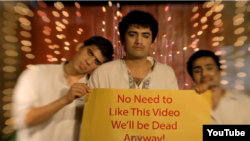Pakistan’s thriving news industry faces challenges in covering military influence, religious intolerance and other sensitive issues, analysts say.
But a growing number of young Pakistani satirists – from comedian Danish Ali to the Beygairat (Dishonorable) Brigade music group – are adding pointed laughter to the conversation by using satire to address political and social issues.
And to test boundaries and maybe change perceptions of, and prospects for, the conservative nation.
“There is too much seriousness in Pakistani society now; the violence, the political instability, the economic fragility,” said Ammara Durrani, executive director at Search for Common Ground Pakistan, a peace-building organization.
Pakistan’s golden age of satire, in the 1980s, saw the rise of artists such as Anwar Maqsood, whose popular comedy show “Fifty Fifty” skewered the country’s Islamist turn under President Zia-ul-Haq, Durrani said.
Today’s satire, much of it based on the tension between 1980's Islamism and conservatism and liberal social attitudes, “could start the process of social healing and cultural revival that Pakistan has missed out [on] for three decades,” she added.
Ali, a 31-year-old doctor turned comedian, promotes laughter as the best medicine. He hosted Pakistan’s first English-language comedy show, “The Real News,” which aired in 2006 and 2007.
“The Real News” played off actual news events. For instance, it parodied how drivers of diplomatic or “protocol” cars frequently ignore traffic signals, ordering civilians’ cars out of the way. In one clip, the driver of a protocol car, incessantly using its horn, demands that a hapless driver give way to a cow or put the car in reverse and go backward.
“Because there are a lot of things you can’t talk about in Pakistan, that’s the most natural place to go to. You say it in a satirical way, so you’re saying it but you’re not really saying it,” Ali said.
Ali, who has switched his comedic rap from English to Urdu to broaden his audience, is building an audience on social media. His Facebook page has more than 87,000 “likes.”
For Ali, the goal is to foster better understanding of Pakistan both at home and abroad: “If I can portray Pakistan in a normal light like the way it is – it’s just a normal country, with regular people – I’ve done my job.”
While Ali focuses on social themes, the Beygairat (Dishonorable) Brigade takes aim at the political arena.
The band’s name itself pokes fun at pro-military analysts known as the Ghairat (Honorable) Brigade, said lead singer Ali Aftab Saeed.
“Political analysts, those who get all the newspaper and the TV space… believe you can’t criticize the military because it is against our national agenda and equal to being a traitor,” said Saeed, who notes the Lahore trio’s “point of view is the antithesis of the Ghairat (Honorable) Brigade.”
The band has a hit with its latest song, “Dhinak Dhinak,” which satirizes the military and challenges the notion of its birthright to power. It’s a reasonable question in Pakistan, which spends 20 percent of its budget on defense and less than 2 percent on education.
In a video set at a wedding, band members perform a qawwali – traditional South Asian music praising the Prophet Muhammad and Sufi saints. The trio – Saeed, Hamza Malik and Daniyal Malik-- jokes that the military can solve the country’s problems through coups, proxy wars and bribing journalists.
“Who will check these merry men? Who dares to stop them?” they sing.
“People actually believe that a general … can do no wrong,” Saeed said.
Beygairat Brigade formed in 2011 and had a hit that year with its first release, “Aalu Anday.” It critiqued the assassination of Salman Taseer, the Punjabi provincial governor killed by his own bodyguard for speaking out against the country’s blasphemy law.
“What moved us was not just that he stood for a cause ... but actually the fact that Mumtaz Qadri, the person who killed Taseer, was made a hero,” Saeed said.
In the “Aalu Anday” video, the band mocks how people like Qadri are celebrated in Pakistan, while Abdus Salam, the country’s only Nobel Prize winner, is shunned because of his religion.
Anonymous threats
Beygairat Brigade’s satire comes at a cost.
The band has received anonymous threatening phone calls, Saeed said, and studios refused to record “Dhinak Dhinak” because of its military content. The Pakistan Telecommunication Authority repeated has taken down its video clip, whose final scene shows the three band members holding a sign that reads, “No Need to Like This Video, We’ll be Dead Anyway!”
Saeed said the band releases its work on social media and has overcome Pakistan’s ban on YouTube distribution. “By the time it gets picked up [in] the traditional media, I think we manage to have such an audience that they spare us,” he said.
He estimates the video has had more than a million views, though accurate numbers are not possible to obtain.
Beygairat (Dishonorable) Brigade’s popularity stems from its ability to relate to its audiences, said Huma Yusuf, a media researcher and fellow at the Woodrow Wilson Center, a Washington-based think tank.
“Anyone who knows Pakistanis well knows that if you get enough of them in a room together, they will first talk about politics, and then inevitably they will imitate and mock the politicians,” she said.
“Humor is a big thing,” agreed Sonya Rehman, a Pakistani journalist who has written about the Beygairat Brigade. “It’s very, very important, and [it’s] how you package it.”
“As the space for debate opens up in Pakistan and we are able to, in critical and more transparent ways, start having conversations about no-go issues,” the Wilson Center’s Yusuf said, “… there will be more confidence amongst younger generations to also then satirize those tensions.”






